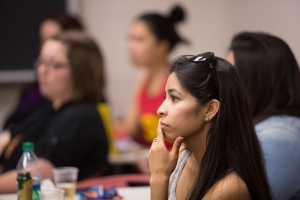School Launches New Curriculum
October 16, 2015- Students
Revolutionary changes in the U.S. health, education and welfare systems demand a different kind of social worker – one who has the knowledge, skills and attitudes to work in emerging and evolving areas, and even for jobs that do not yet exist.
To address this need, the USC School of Social Work has redesigned its curriculum, ensuring it is producing social workers prepared for current and future challenges.
"Our curriculum has an entirely new profile. We have completely revised all our courses, housed them in a new departmental structure and changed the underlying concept of what our graduates must master,” said Marilyn Flynn, dean of the School of Social Work. "I was honored to witness the leadership and extraordinary collaboration of our faculty and staff in developing this new curriculum structure that strengthens the ability of our graduates to lead 21st century programs."
While the new curriculum builds on the school’s historic strengths, it places a stronger emphasis on the science of social work, leadership and core competencies, and allows for more intensive preparation within the student’s chosen department of study. The new curriculum, which reflects feedback from employers and alumni, emphasizes critical thinking, communication and collaboration as essential skills. Content has been revised to incorporate evidence-based and evidence-informed programs, implications of new findings in neuroscience, new directions in prevention and early intervention, as well as best practices used by social workers in a variety of fields.
The school now is organized into three departments: 1) Adults and Healthy Aging; 2) Children, Youth and Families; and 3) Community, Organization, and Business Innovation. Students select one of these departments of study and complete one semester of foundation courses centered on the values, knowledge and skills for generalist social work practice and three semesters of courses focused on department-specific issues.
Adults and Healthy Aging
This department is focused on enhancing the mental health and physical well-being of young adults to seniors, in their homes, neighborhoods, communities and society. Students are taught using the biopsychosocial perspective and with an emphasis on the role of neuroscience in the interacting systems of mind, brain and body with larger social systems of family, culture and community . The curriculum is grounded in principles of person-centered care, holistic health, wellness, resilience, recovery and the strengths perspective. Coursework includes navigating the Affordable Care Act and learning the skills needed to bring new integrated care models into service areas that have traditionally operated independently.
Children, Youth and Families
Poverty, homelessness, substance abuse, mental illness, domestic violence, and child abuse and neglect can have long-term consequences for children, youth and families. Findings from neurobiology and prevention science are fueling the development of new strategies to strengthen families and build strong social environments to support them. This department prepares students to address these needs from early childhood through adolescence and the transition to adulthood. Coursework focuses on prevention and early intervention, promoting and sustaining healthy children and youth and the social environments in which they live, as well as on service programs showing the best results for families with diverse racial, ethnic and socioeconomic backgrounds.
Community, Organization and Business Innovation (COBI)
This department prepares students to lead bold, large-scale solutions to social problems and drive positive change in communities, organizations, businesses and government agencies. Traditionally, this area of study has been called “macro social work,” which focuses on leadership, administration, community development and policy advocacy. The COBI curriculum also emphasizes skill development in areas such as financial management, grant writing, policy analysis and program evaluation. Students who set their sights on agency leadership or substantial policy influence will find this a great training ground. It also attracts students looking for something more non-traditional, such as a position within a corporation, where they may help employees manage the demands between work and life, assist companies in philanthropic and corporate social responsibility activities, and help guide businesses in building positive relationships with their communities.
Students in all departments can also select an additional option for further specialization, most of which require two additional courses. Examples of options include Military Social Work, Public Child Welfare and School Social Work. Or, students with particular professional interests may individualize their program of study by choosing two electives from another School of Social Work department or in another university department.
Field Education
While the field requirements of two internships, or 1,000 field hours, remains the same, the school has made some enhancements to its program to improve the alignment between field placement and curriculum.
The first placement requires 14 hours a week at an agency that aligns with a student’s department and will now include a two-hour practice lab in the first semester. In this lab, students will be trained to apply three evidence-based interventions: motivational interviewing, problem-solving therapy and cognitive behavioral therapy. In the second semester, the minimum required hours will increase to 16 hours a week and include a two-unit field seminar.
In the second year of the program, students will increase their field time to 20 hours a week, and in some cases, may be able to remain at their original field site if the organization can facilitate advanced learning experiences. Additionally, second-year students will participate in a one-unit field seminar where they will learn to apply evidenced-based interventions specific to their department.
The new curriculum is in effect for all campus-based students who enrolled this fall. However, the new curriculum roll-out for online students in the Virtual Academic Center is slated for fall 2016.
To reference the work of our faculty online, we ask that you directly quote their work where possible and attribute it to "FACULTY NAME, a professor in the USC Suzanne Dworak-Peck School of Social Work” (LINK: https://dworakpeck.usc.edu)
